If you believe Elon Musk, the audit of the federal government he’s leading through the Department of Government Efficiency (DOGE) will deliver an accomplishment long thought impossible: a balanced budget.
On February 7, President Donald Trump posted a short and enthusiastic message on his Truth Social Account: “Balanced Budget!!! DJT” After right-wing provocateur Charlie Kirk tweeted, “The Dems are going to lose their mind,” Musk weighed in with confidence. “Balanced budget is going to happen.”
Don’t believe Elon Musk: DOGE will not balance the budget. There is no way to change the trajectory of our national debt—to say nothing of balancing the budget—without structural entitlement reform, something Trump has adamantly opposed throughout his political career. DOGE doesn’t have the statutory authority to do that, and, more importantly, the president is ruling it out. “Social Security won’t be touched, other than if there’s fraud or something we’re going to find it. It’s going to be strengthened. But won’t be touched,” Trump told Sean Hannity in an interview that aired on Tuesday night. “Medicare, Medicaid—none of that stuff is going to be touched. You don’t have to.”
You do, in fact, have to touch these programs if you’re going to get serious about shrinking deficits and reducing the country’s debt burden. And if you’re a limited-government conservative like me, there’s reason to be concerned that whatever good the newly minted DOGE might do—and it’s already doing some good—the president’s dogged determination not to address the real drivers of our debt will actually exacerbate the public misunderstanding of the country’s fiscal outlook and make meaningful reform more difficult.
There’s a strong argument in favor of the kind of audit DOGE has undertaken in recent weeks. The administrative state has grown unchecked for decades, and the kinds of real waste and abuse suddenly exciting the MAGA movement have been a problem for even longer. The Cato Institute’s Chris Edwards has been publishing his meaty “Downsizing Government” report since 2005, and the U.S. Government Accountability Office (GAO) reported last summer that federal agencies found a staggering $236 billion in “improper” payments in fiscal year 2023—payments that “shouldn’t have been made, were made in an incorrect amount, or lacked sufficient supporting documentation.”
Even if his broader understanding of how the U.S. government works is … lacking, Elon Musk is correct when he says the bureaucracy is widely unaccountable; there is an awful arrogance that characterizes too many with power in the administrative state. As I reported more than two decades ago, for example, the Food and Drug Administration once forced Sargento Foods to conduct a “voluntary” recall after an anomalous test showed possible listeria contamination in its cheese. Multiple subsequent tests—by the company and the government—had found the cheese to be bacteria-free, but it didn’t matter. The recall went forward, Sargento lost lots of money, and when the FDA later acknowledged its test had been “incorrect,” it refused to answer media inquiries about the error. Despite all of this, and mindful that his company’s dealings with the FDA would continue in perpetuity, the CEO of Sargento issued a statement praising the FDA for its work.
So, by all means, audit the federal government, root out the waste, prosecute the fraudsters, and go after the abusers. Modernize procurement, update payment systems, and save the taxpayers money. But don’t pretend that any of this will balance the budget or even meaningfully change the trajectory of our ever-growing debt.
The current problem isn’t hard to understand: In the absence of major reforms, the U.S. government will, for the foreseeable future, spend significantly more on entitlement programs and interest on our existing debt than on the kinds of discretionary programs Musk’s DOGE audit is targeting. As then-Senator Marco Rubio put it in 2017: “You also have to bring spending under control. And not discretionary spending. That isn’t the driver of our debt. The driver of our debt is the structure of Social Security and Medicare for future beneficiaries.”
How much more? Let’s spend a moment in the 2024 edition of the “Budget Chart Book” published each fall by Jessica Riedl at the conservative Manhattan Institute. It is, as the name suggests, a collection of easy-to-understand charts that looks at spending by the U.S. government—136 pages in total.
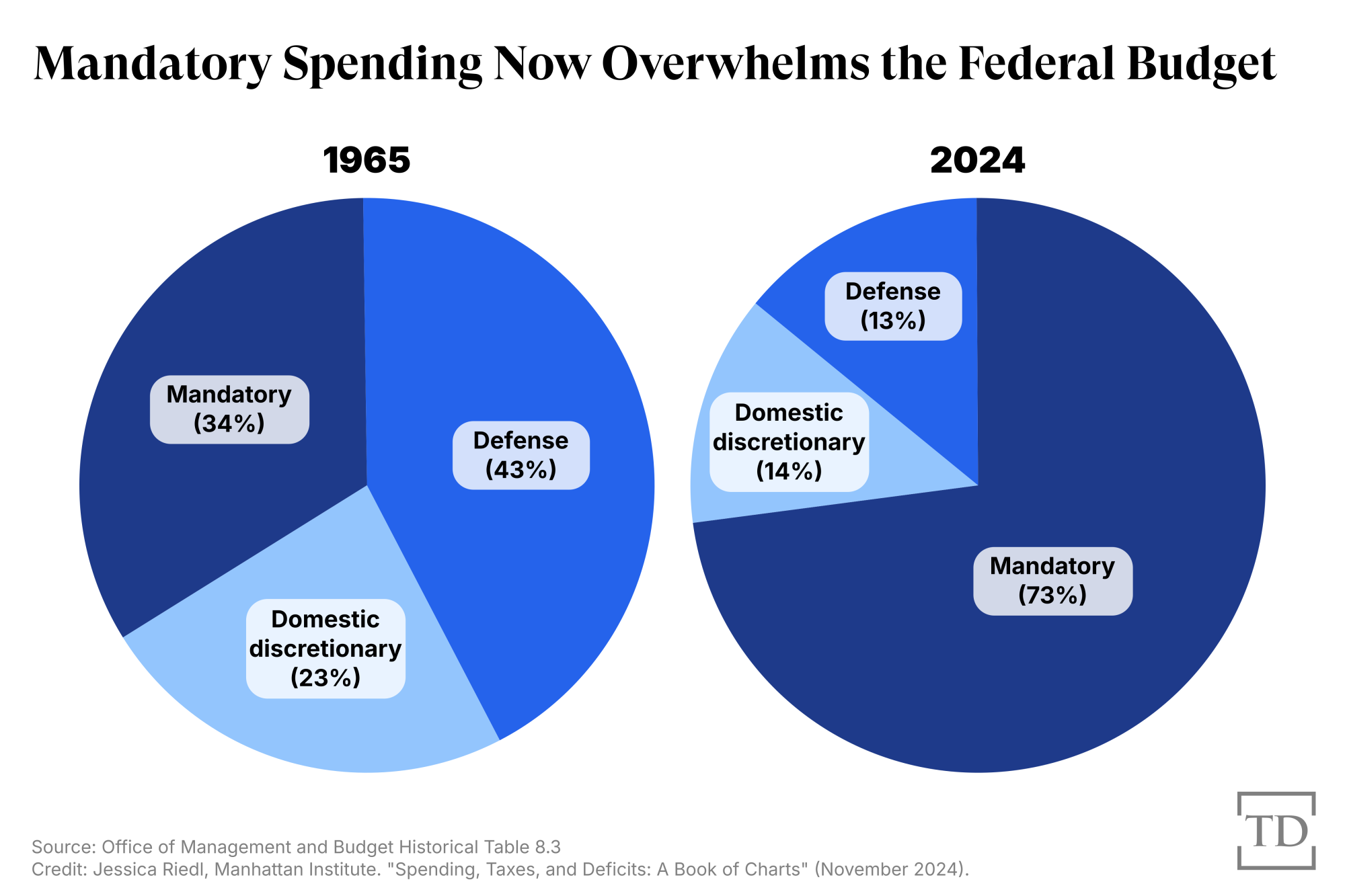
As outlined on page 40, the federal government spent 43 percent of its budget in 1965 on defense, 34 percent on mandatory programs (including entitlements), and 23 percent on discretionary domestic programs. In 2024, an eye-popping 73 percent of spending goes to mandatory programs, with just 14 percent on domestic discretionary programs and 13 percent on defense. Why the shift? An aging population with longer lifespans means a greater demand for scarce resources. With relatively fewer people paying into these programs and those drawing on them doing so for longer, the government is borrowing more to keep promises made years ago.
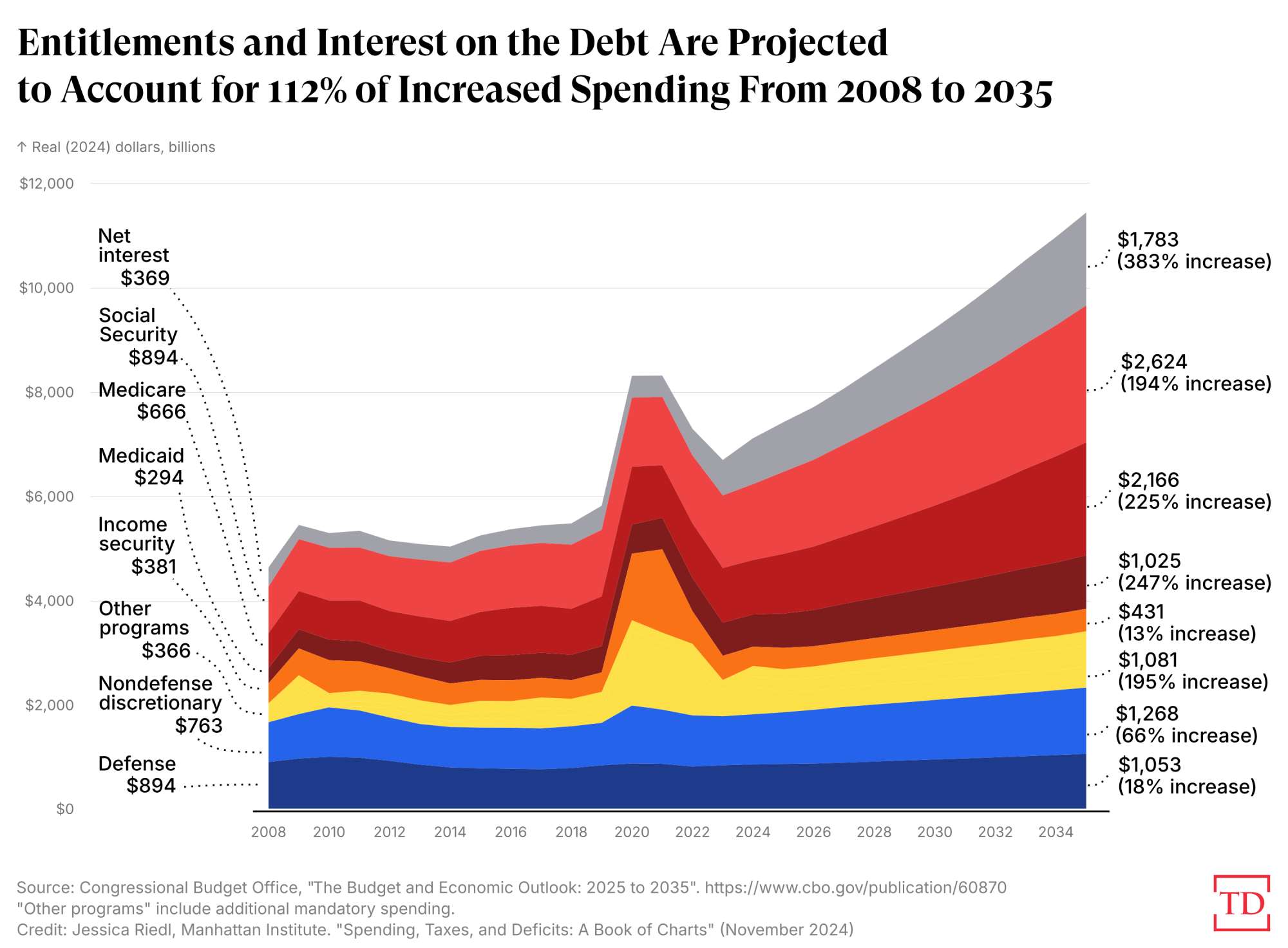
Riedl is just one economist—albeit one of the best ones out there—but just about all serious analysts who look at the U.S. fiscal picture see it the same way. The Committee for a Responsible Federal Budget, a nonpartisan think tank, recently used the latest projections from the Congressional Budget Office to conclude that about 83 percent of the projected spending growth from 2025 to 2035 can be attributed to Social Security, interest on the debt, and health care (including Medicare, Medicaid, Affordable Care Act Subsidies, and the Children’s Health Insurance Program).*
So, Trump and Musk are claiming they will balance the budget while simultaneously announcing that they won’t touch the programs most responsible for growing deficits. It’s either innumerate or dishonest—but either way, pretending to address the growing crisis while steadfastly refusing to do so is dangerous.
“It is virtually impossible to eliminate a $1.8 trillion budget deficit with President Trump already taking the two-thirds of the budget spent on Social Security, Medicare, defense, veterans, and interest off the table. Nearly every other program would have to be eliminated,” Riedl told The Dispatch. “This promise is so silly as to be disqualifying.”
The seeds of entitlement reform are planted.
In the weeks after the historic Tea Party elections of 2010, dozens of well-meaning, newly elected Republicans came to Washington determined to reverse the seemingly inexorable growth of the federal government. The first two years of Barack Obama’s presidency had brought an aggressive and unapologetic expansion of the role of government—from the fund-everything stimulus package to the launch of Obama’s far-reaching and intrusive health care plan. The midterm elections provided an unmistakable rebuke to the new president’s ambitious agenda. Republicans in the 112th Congress, sworn in on January 3, 2011, were elected on promises to block the continued growth of government under Obama and finally get serious about the budget after years of empty GOP rhetoric on spending.
There was just one problem.
Many of these apostles of austerity elected to the House of Representatives had very little understanding of the real causes of annual budget deficits or the drivers of the national debt. “Most of them thought that if we eliminated pork, we’d balance the budget,” said one Republican involved in those early spending reform efforts.
It was a preposterous misapprehension. Pork—congressionally directed “earmark” spending on pet projects like the Sparta Teapot Museum of Craft and Design and Alaska’s famous “Bridge to Nowhere”—was a tiny fraction of the fast-growing debt. Citizens Against Government Waste estimates that fiscal years 2008-2010 saw averages of 10,299 earmarks at a cost of $17.8 billion. The annual deficit in 2010 was $1.3 trillion, and the national debt was $13.56 trillion. The real drivers of the growing fiscal crisis facing the country—entitlements including Medicare, Medicaid, and Social Security—were no secret.
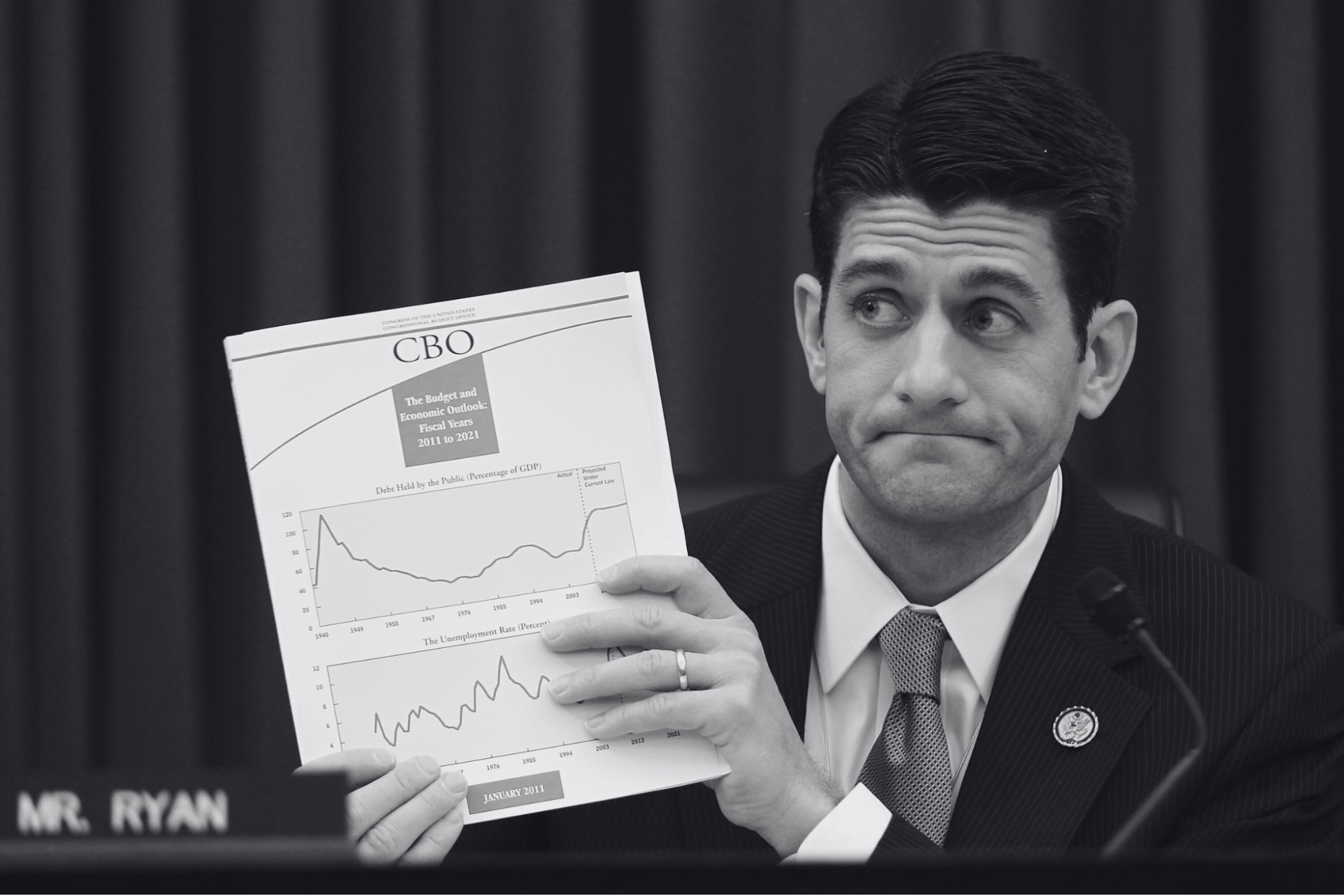
GOP Rep. Paul Ryan of Wisconsin, then the chairman of the House Budget Committee, had spent years studying entitlements and sought to turn the well-meaning budget-cutting enthusiasm of his new colleagues into support for structural reform. Entitlements had long been regarded as the “third rail” of American politics—touch them, and you’re politically dead. So ingrained was this conventional wisdom that when Ryan began to push his reforms, the National Republican Congressional Committee warned candidates against embracing them.
Nevertheless, Ryan began convening small sessions with House Republicans—five or six at a time—and walking them through a detailed presentation laying out the challenges and his proposed solutions. He eventually persuaded House Speaker John Boehner to allow him to include some entitlement reforms—including block-granting Medicaid to the states and transforming Medicare from a guaranteed benefit program to one that provided vouchers to individuals to make health care purchases in the private market—in the official GOP budget proposals.
Republicans would go on to include these reforms in their formal budget proposals every year from 2011 to 2015, even as Democrats demagogued the issue on the campaign trail and in official events. In April 2011, the Obama White House invited Ryan to an event at George Washington University where the president was expected to lay out his views on debt and spending. With Ryan seated near the front of a packed auditorium, just a few feet from Obama—who had long implored Republicans to offer good-faith policy proposals to address the nation’s growing health care costs—the president blasted Ryan’s proposal as “less about reducing the deficit than it is about changing the basic social compact in America.” (Obama would later claim he didn’t know Ryan would be in attendance and call his frontal attack a “mistake.”)
Obama wasn’t the only politician to demagogue Ryan’s proposals. Three months later, in a July 2011 interview with conservative talk radio host Erick Erickson, Donald Trump blasted Ryan’s plan as “political suicide for the Republican Party” and shrugged off concerns about the role of entitlements in driving the country’s debt crisis. Medicare, Trump argued, “happens to be a good program. The problem with Medicare is that there’s tremendous fraud and there’s tremendous waste. And you can solve that through good management, which this country doesn’t have.”
“Look at the Democratic commercials. Everything is about Medicare, Medicare, Medicare,” he added. “What Paul Ryan did is an unbelievable mistake. And it’s an unbelievable disservice for people who are running for office if they are Republicans.”
Ryan, the policy wonk, favored reform. Trump, the populist, favored whatever he thought was popular.
Trump carried this view through his 2016 presidential campaign, vowing on the debate stage to protect entitlement programs from his Republican rivals who had promised to reform them. When Trump became the de facto Republican nominee in the spring of 2016, Ryan, who had since been elevated by his conference to speaker of the House, was asked in an interview whether he’d endorse the new leader of his party. When Ryan demurred—” I’m not there yet,” he said—his old friend from Wisconsin, Republican National Committee Chair (RNC) Reince Priebus, proposed a break-the-ice meeting between the two men. When they gathered in Priebus’ office at RNC headquarters, the meeting moved quickly from small talk to policy, and Ryan started to walk Trump through his entitlement reform PowerPoint. Trump listened impatiently for a couple of minutes before cutting the speaker off and suggesting he’d tackle the issue in his second term.
A very different Republican Party.
Trump’s second term is here, and he has provided no indication that entitlement reform is on his agenda.
It should be. America’s fiscal challenges are far more urgent today than they were even during the Tea Party era, with a budget deficit of $1.8 trillion in fiscal year 2024 (up 38 percent from 2010) and a national debt of roughly $35.5 trillion (up 162 percent from 2010). And yet the Republican Party under Donald Trump has largely abandoned even the pretense of fiscal restraint. Indeed, among the most striking political developments over the past decade has been Trump’s ability to transform the GOP from a party that at least made the noises one might expect to hear from limited-government conservatives to a party that’s often indifferent to—and sometimes opposed to—limited government.
Roughly $8 trillion of that debt was accumulated during Trump’s first term. Some of that spending can be attributed to emergency pandemic-related federal spending during Trump’s final 10 months in office, in which he repeatedly pushed for higher levels of spending than even congressional Democrats. “I would like to see a bigger stimulus package frankly than either the Democrats or Republicans are offering,” Trump said three weeks before the 2020 election. But Trump’s eagerness to spend big during the COVID-19 crisis was a continuation of his previous profligacy, not a departure.
“The truth of the matter is that the first two years of the Trump administration, when the Republicans had the House and the Senate, we raised spending faster than the last couple of years of the Obama administration,” Mick Mulvaney, a co-founder of the House Freedom Caucus who went on to serve as Trump’s chief of staff at the White House, told The Dispatch in early 2021.
Former Vice President Mike Pence has expressed similar sentiments. “I don’t think we did what needed to be done on federal spending,” he said in an April 2023 interview on The Dispatch Podcast as he was preparing to launch his presidential campaign. “We did not put a priority on either controlling domestic spending broadly or certainly never even talked about the real issue facing my children and my grandchildren, which is a debt crisis the likes of which the world has never known.” Trump’s approach, Pence said, is that “we’re never even going to talk about Social Security and Medicare.”
And if Trump’s not talking about it, neither are other Republicans. GOP lawmakers today—including some members of the Tea Party movement that have stuck around—spend far more time talking about how to use government to achieve their preferred ends than making the case to check the growth of its power. The House Freedom Caucus still agitates for discretionary spending restraint, but in its day-to-day functioning, it mostly plays the role of loyalty enforcer for Trump. Marco Rubio, who was first elected to the Senate in the Tea Party wave of 2010 and ran for president in 2016 as an unapologetic limited-government conservative, spent his final days in Congress pushing industrial policy and a more activist government role in the economy. Ted Cruz, who in 2013 brought the Senate to a halt with a quixotic filibuster to block Obamacare, supported Robert F. Kennedy, Jr.—a proponent of single-payer health care—as secretary of Health and Human Services (HHS). Congressional Republicans ended earmarks in the halcyon days of the Tea Party but agreed with Democrats’ push to reinstate them in 2021. In recent years, Republicans have actually requested more dollars per earmark than their colleagues across the aisle.
A DOGE precursor.
Donald Trump has never pretended to be a movement conservative, but there were times that his first term felt like a more traditional Republican presidency. He deferred to Ryan and other congressional Republicans on tax policy and Sen. Mitch McConnell on judges—two areas where Trump made considerable strides in limiting the reach of government. There was another, less ballyhooed small-government success from his first term as well—and it could provide a glimpse at how Trump might be thinking about Elon Musk and DOGE today.
As the Republican presidential primary was ramping up in 2015, Home Depot Founder Bernie Marcus approached Karl Rove with an idea. Regulation is killing American business, Marcus said, and the next Republican president should have a plan to reverse it. Barack Obama’s administration was well on its way to issuing nearly 3,000 new regulations over his two terms at a price tag of $870.5 billion, according to figures from the American Action Forum.
Marcus pledged $6 million for the project, which would include an in-depth analysis of the regulatory creep and detailed, line-by-line proposals for deregulation efforts at various federal agencies. These reports would be produced in consultation with lawyers who had worked in these bureaucracies and knew how to overcome various procedural obstacles, and the final product would be an off-the-shelf deregulation plan provided to the Republican nominee, whomever he or she might be.
Rove took the project to Steven Law, his colleague at the Republican super PAC American Crossroads, who reached out to Andrew Bremberg, a domestic policy wonk who had stints at HHS during the George W. Bush administration before working for McConnell on Capitol Hill. Shortly after Trump secured the Republican nomination, Marcus presented the new GOP leader with two binders of recommendations during a flight on Trump’s plane. According to two people briefed on the conversation, Trump was broadly supportive of the project—he’d been frustrated over the years by burdensome red tape slowing down his real estate developments—but he didn’t engage much in its details. Bremberg was brought on to the Trump transition and eventually took a job as director of the Domestic Policy Council in the White House.
As president, Trump had little day-to-day involvement in the deregulation project, but everyone working on it understood he supported the effort. The general guidance was that the effort would aim to remove two regulations for every new regulation it added, and Trump’s willingness to buck convention created additional space for the team to push for results. “Trump wasn’t hands-on at all,” one senior White House official who worked on deregulation said. “But he loved ‘one in, two out.’”
“It was put in front of him,” a second top Trump adviser remembered. “He wasn’t that engaged in it. I don’t think he fully appreciated it at the time, but over time, he came to appreciate it as people told him how great it was.”
Several current and former Trump advisers who spoke to The Dispatch say they see a similar pattern with DOGE. Trump has long been driven to win the support of the country’s wealthiest, smartest, and most powerful individuals, and Musk is the world’s richest man, widely considered a genius, and has built successful companies in the sectors driving the growth of the U.S. economy. Trump was proud to have secured Musk’s endorsement during the 2024 campaign, and as the two men developed a relationship, the once and future president sought the magnate’s advice on a wide range of topics—and welcomed his prodigious financial support.
On September 5, 2024, Trump gave a speech at the New York Economic Club laying out his vision for the economy and announcing that Musk—whom he described as a “smart guy” who “knows what he’s doing”—would lead a task force looking for ways to streamline how the federal government conducts its business. “I will create a government efficiency commission tasked with conducting a complete financial and performance audit of the entire federal government and making recommendations for drastic reforms,” Trump said. “We need to do it. Can’t go on the way we are now.”
“As the first order of business, this commission will develop an action plan to totally eliminate fraud and improper payments within six months,” Trump continued. “This will save trillions of dollars—trillions.”
According to three Trump advisers familiar with the planning, the commission as originally conceived was to focus its attention on modernizing procurement and payment systems, digitizing government assets and records, and updating acquisition processes. Musk’s task force would be free to recommend cuts, too, but it was much closer to Al Gore’s “Reinventing Government” initiative than the demolition project that it’s since become. “When they first announced it, no one thought this guy was going to go department by department, agency by agency, and just start dismantling stuff,” said one person familiar with the project. “It just morphed into this.”
According to these advisers, Musk has become obsessed with the feedback he gets on Twitter/X—and doing things like blowing up USAID generates more likes and “attaboys” than mundane reforms to payment processing. Tweeting false and misleading claims about payments to media outlets and pounding his chest about balanced budgets might get him love from Sean Hannity and MAGA influencers, but it does little to address the real problems Musk was brought in to tackle and, worse yet, it further confuses the public about the country’s growing debt crisis.
“DOGE’s biggest disservice has been convincing a lot of voters that the budget can be balanced by cutting waste, and that such reforms do not require going through Congress and the democratic process,” said Riedl, the Manhattan Institute budget expert. “Substantially cutting spending is very difficult and politically fraught, which is why even a GOP Congress typically balks at it.”
The future of entitlement reform.
On February 7, the same day that Trump and Musk tweeted their respective pledges to balance the budget, the president answered a question from NBC News’ Garrett Haake that made clear they wouldn’t be able to keep their promises. Haake wanted to know if there were areas that Trump had told Musk he was not to touch: “The bulk of federal spending is Social Security, Medicare, programs like that. Would you like to see him look at those programs as well?”
Trump rambled evasively—blaming immigrants, Californians, and “a lot of bad people” he claimed shouldn’t be on these programs—before ruling out any reforms. “We’re going to strengthen Social Security, etc.,” he said. “We’re not going to touch it—other than to make it stronger.”
“You want to be supportive of cutting discretionary spending, but how do you do that without acknowledging that it’s not the main issue?” said one longtime conservative movement leader. “They’re trying to send a signal that they care about the debt issue, but they’re not really addressing the big thing. DOGE is the cheap way out for the whole thing.”
Correction, February 21, 2025: This article originally included an incorrect chart about the federal budget, flipping mandatory and discretionary spending figures from 1965. The reference to the Committee for a Responsible Federal Budget has also been updated to note it is a nonpartisan organization.
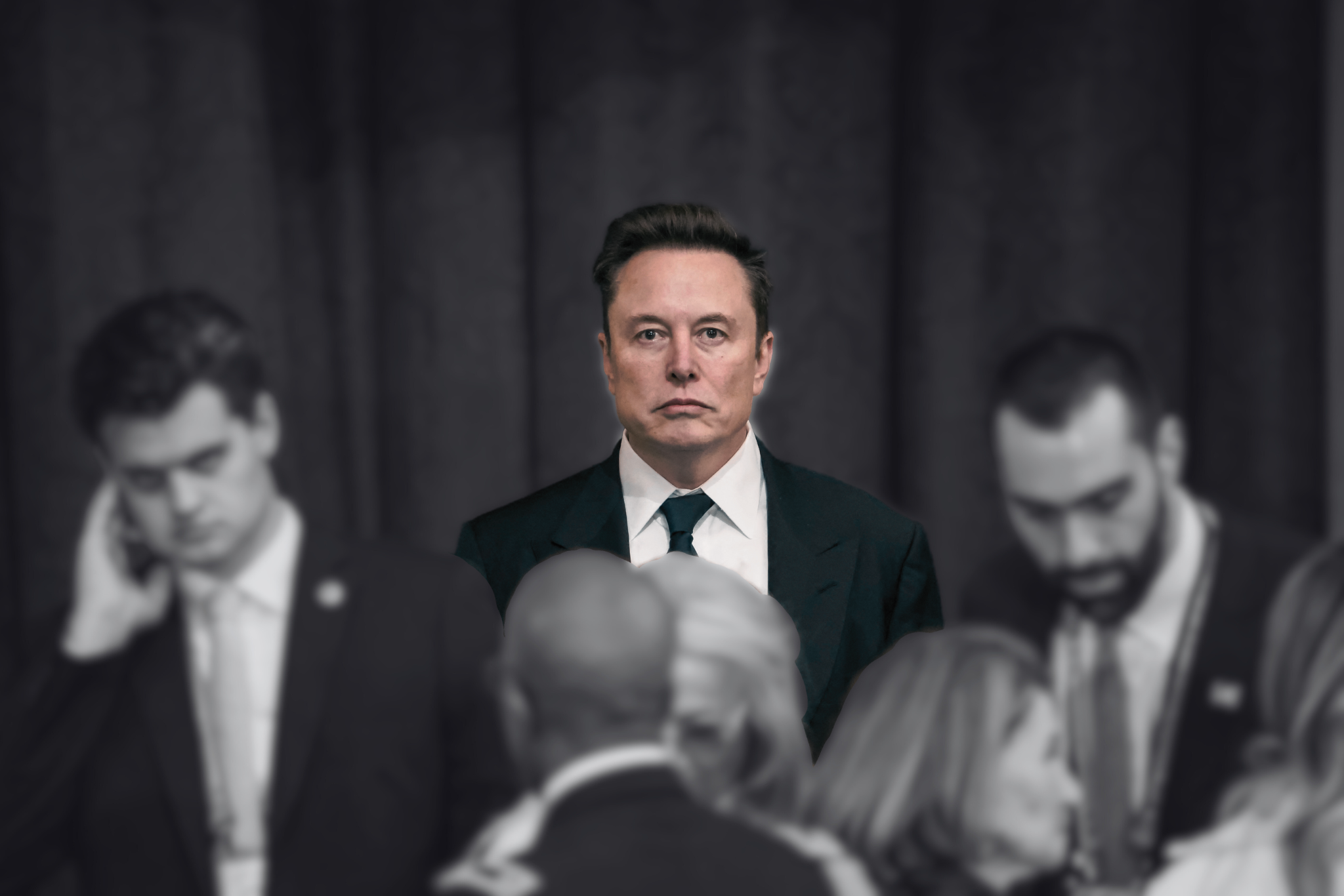


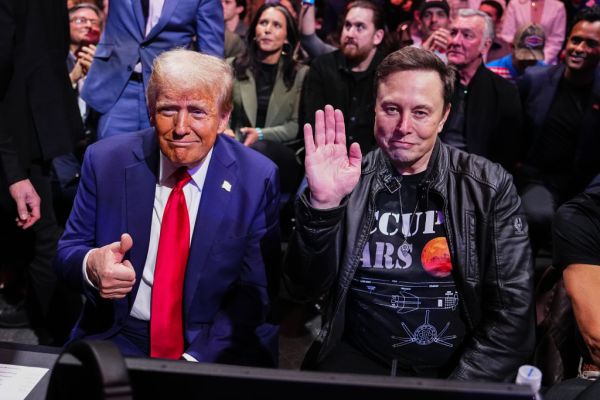
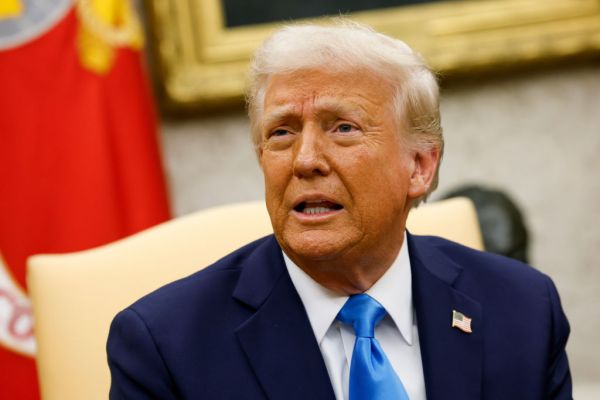

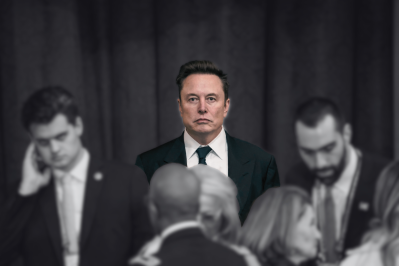
Please note that we at The Dispatch hold ourselves, our work, and our commenters to a higher standard than other places on the internet. We welcome comments that foster genuine debate or discussion—including comments critical of us or our work—but responses that include ad hominem attacks on fellow Dispatch members or are intended to stoke fear and anger may be moderated.
With your membership, you only have the ability to comment on The Morning Dispatch articles. Consider upgrading to join the conversation everywhere.